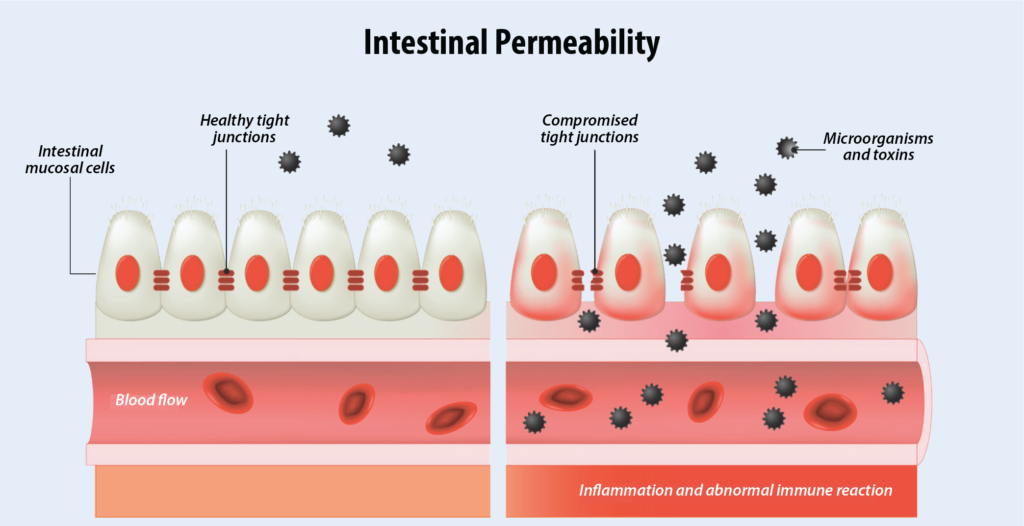Over 2,000 years ago, Hippocrates stated
“All disease begins in the gut.” Since then, scientists have explored the unique link between gut health and numerous diseases, confirming that many health issues do in fact originate from a compromised gut.

Gut health plays a critical role in overall well-being. One of the key elements of maintaining a healthy gut is the integrity of the intestinal mucosal lining. This lining acts as a barrier between the contents of our digestive system and underlying tissues, preventing harmful substances from entering the bloodstream.
The Significance of Intestinal Mucosal Lining
The intestinal mucosal lining is a thin layer of cells that covers the inner surface of the digestive tract. Its primary functions include absorbing nutrients from the food we eat and acting as a protective barrier against harmful substances. The lining also houses a diverse community of beneficial gut bacteria that aid in digestion and support a healthy immune system.
Leaky Gut and its Consequences
When the intestinal mucosal lining becomes compromised or damaged, the condition known as “leaky gut” can occur, leading to a host of health issues and unpleasant symptoms. In this condition, the tight junctions between the cells of the intestinal lining loosen, allowing undigested food particles, toxins, bacteria, and waste to pass through the intestinal barrier and enter the bloodstream.

This infiltration triggers an immune response, leading to inflammation and a range of health problems, including:
- Digestive Issues: Leaky gut can lead to bloating, gas, diarrhea, constipation, and abdominal discomfort.
- Food Sensitivities: The presence of undigested food particles in the bloodstream can cause the immune system to identify certain foods as threats, leading to food sensitivities or allergies.
- Autoimmune Conditions: Increased inflammation can contribute to or worsen autoimmune disorders.
- Fatigue and Brain Fog: The inflammatory response can impact energy levels and cognitive function, leading to fatigue and brain fog.
- Skin Problems: Leaky gut has been linked to skin conditions such as acne, eczema, and psoriasis.
- Weakened Immune System: A compromised gut barrier can reduce the body’s ability to defend against infections and illnesses.
Natural Ingredients to Support GI Health
Fortunately, nature has provided us with several natural ingredients that can help support a healthy gut lining and overall GI health.
- Glutamine: Glutamine is an essential amino acid that plays a crucial role in maintaining the integrity of the intestinal mucosa. It is a primary fuel source for the cells that make up the gut lining and helps restore damaged tissues.
- Glucosamine: While commonly known for its joint health benefits, glucosamine also contributes to gut health by supporting the production of glycosaminoglycans, essential components of the intestinal mucosal lining.
- Probiotics: These “good” bacteria help maintain a balanced gut microbiome, promoting proper digestion and absorption of nutrients, supporting immune function, and reducing the risk of gastrointestinal issues such as bloating, gas, and diarrhea.
- Collagen: This structural protein plays a key role in tissue repair and regeneration throughout the body, including the gut lining. Collagen helps promote the growth of new healthy cells, strengthening the gut’s mucosal barrier. Collagen contains specific amino acids, such as glycine and proline, which possess anti-inflammatory properties.
- MSM (Methylsulfonylmethane): MSM is a naturally occurring sulfur compound found in various foods. Sulfur is essential for the production of collagen.
- Deglycyrrhizinated Licorice (DGL): DGL is a form of licorice root extract that has had the compound glycyrrhizin removed to avoid potential side effects. DGL is known for its soothing properties on the gut lining and can help alleviate inflammation.
- Slippery Elm: Slippery elm contains mucilage, a substance that becomes gel-like when mixed with water. This gel can coat and soothe the GI tract, promoting healing and reducing irritation.
- Marshmallow Root: Marshmallow root also contains mucilage, similar to slippery elm, which can coat the digestive tract and provide a soothing effect on irritated tissues and support the healing of the intestinal mucosal lining.
- Digestive Enzymes: Digestive enzymes aid in the breakdown of complex nutrients into simpler forms that the body can absorb easily. As dietary supplements, these enzymes can enhance the digestive process, alleviating discomfort associated with indigestion, bloating, and nutrient malabsorption, ultimately supporting overall gut health.
- Ginger Root: Ginger contains bioactive compounds that can help modulate inflammation in the gut and promote smooth digestion. Ginger can also help alleviate nausea and discomfort, making it an excellent choice for individuals with gastrointestinal disturbances.
Maintaining a healthy intestinal mucosal lining is vital for optimal gut health and overall well-being. For individuals with digestive or gut health issues, a healthcare professional can help determine the most appropriate course of action. In addition to making conscious lifestyle choices to nurture GI health, gut-supporting natural ingredients may play a role in a comprehensive approach to create a thriving digestive system.
References
Aleman RS, Moncada M, Aryana KJ. Leaky Gut and the Ingredients That Help Treat It: A Review. Molecules. 2023; 28(2):619.
Camilleri M. Leaky gut: mechanisms, measurement and clinical implications in humans. Gut. 2019 Aug;68(8):1516-1526.

